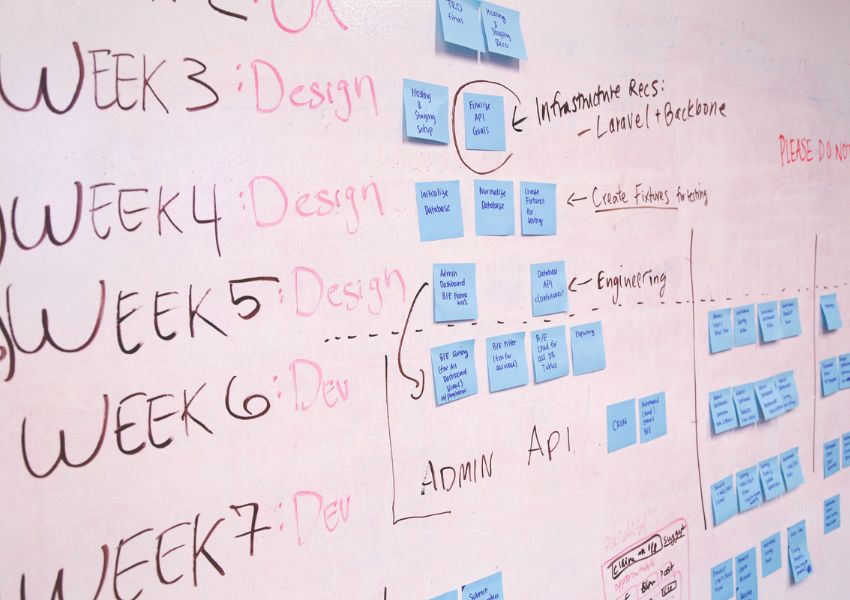It can be easy to feel overwhelmed and stressed out when it comes to projects, whether at work or at home. But there are ways to reduce your stress and make the project more manageable. Why and how can you reduce the stress of completing a project? This guide will give you some tips.
Why Sometimes Projects Can Be Stressful
In our fast-paced world, it’s not uncommon to feel stressed out by a project. Whether it’s a work project, a home improvement project, or even just organizing your closet, completing a project can sometimes be overwhelming.
There are a few reasons why projects can be so stressful.
You might feel like you don’t have enough time to complete the project
This can be especially true if you have a tight deadline. Feeling like you’re running out of time can add a lot of extra stress to a project. The project management triangle says that there are three things that every project must have: time, quality, and cost. So if you feel like you’re running out of time, cutting corners on quality or increasing the budget to finish the project can be tempting.
You might not have all the resources you need
Another reason that can cause project management stress is not having all the necessary resources. This could be anything from not having enough money to complete the project to not having the right tools or even not having enough people to help you. If you don’t have what you need, it can make it much harder to complete a project successfully. Suppose a project manager is assigned to complete a task but is not given enough money to buy the required materials. In this case, the manager would have to find ways to get the money, including asking for donations or getting sponsors.
Uncertain about the outcome
While some projects are very straightforward, others can be more complex. And when a task is challenging, there can be a lot of uncertainty about the outcome. This uncertainty can cause stress because you’re unsure if the project will succeed. Like anything in life, there is always some risk involved in undertaking a project. But you can reduce the stress of uncertainty by doing your homework and planning as much as possible. This way, you’ll have a better idea of what to expect and be more confident in the outcome.
You might be worried about making mistakes
Making mistakes is one of our biggest fears when taking on a new project. Nobody wants to mess up, especially if it’s something important. But the truth is, mistakes happen. And usually, they’re not as bad as we think they will be. Such project stress usually comes from the fear of failure. It is the result of the perfectionism standards that we set for ourselves. So instead of worrying about making mistakes, try to focus on learning from them. Remember, every mistake is an opportunity to grow and learn.
Scope creep
Scope creep when the scope of a project starts to expand beyond its original parameters. This can happen for several reasons, such as involving new stakeholders or unforeseen circumstances requiring additional work. Either way, scope creep can easily lead to project delays and cost overruns. While working on a project, keep a close eye on the scope. If you start to see it creeping up, take action immediately. Discuss with your team or client and work on getting the area back under control. Even when scope creep is unavoidable, there are ways to keep it from spiraling out of control and damaging your project.
Poor communication
Poor communication is one of the leading causes of project stress. Miscommunication can lead to many problems, such as misunderstandings, missed deadlines, and even conflict. To avoid these issues, it’s essential to establish clear lines of communication from the start. Make sure everyone understands their roles and responsibilities. And if you’re working with a team, set up regular check-ins, so everyone is on the same page.
Lack of transparency
Lack of transparency is another common cause of project stress. When stakeholders are in the dark about what’s happening, it can lead to confusion, frustration, and even mistrust. To avoid these issues, make sure you keep everyone in the loop. Share updates regularly, and be open to questions and feedback. One thing that usually causes workplace stress is not knowing what is happening. It can be incredibly stressful if your boss asks you to do something and you have no idea where to start. To avoid this, try to be as transparent as possible. Keep your boss updated on your progress, and ask for help when you need it.
Do you want to reduce your stress while completing a project?
Contact Growth Hackers
Tips for Reducing Stress While Working on a Project
Let’s face it; projects can be stressful. But there are a few things you can do to help reduce the stress of working on a project.
Define the project’s goals and objectives and set realistic goals
When you know what you’re working towards, it can help to reduce stress. Be clear about the project’s goals and what needs to be done to meet those objectives. Start by breaking the project down into smaller, more manageable tasks. Make sure you have at least eight hours of sleep first, then you can start working on the project feeling more relaxed and refreshed. Also, work on the project during the daytime when you have more energy. You may want to avoid working on the task at night as this can make you feel more tired and stressed.
It is essential to set realistic goals for yourself and the project. Setting unrealistic goals makes you more likely to become stressed and overwhelmed. Make sure you are realistic about what can be accomplished and set achievable goals. Like you may have experienced in the past, it is also important to plan for the unexpected. Things will inevitably come up that you did not plan for, but by having a contingency plan in place, you will be able to deal with these issues as they arise.
Set a timeline
If you’re working on a project with a deadline, set a timeline for yourself and stick to it. This will help you stay on track and avoid feeling overwhelmed by the project. Make sure to allow some buffer time in case you encounter any unforeseen delays. This can not only reduce stress, but it can also help you avoid making mistakes. Usually, project managers provide their teams with a timeline. If you don’t have one, ask for one.
Build a team
Alone you can go fast but together you can go far. You want to build a team around you. Find people with complementary skills. If you’re feeling overwhelmed by a project, see if any tasks can be delegated to someone else on your team. This will help lighten your load and allow you to focus on the most critical aspects of the project. It’s also a good idea to build a team of people you can rely on and willing to help out when needed. This can make the entire process much smoother and less stressful.
Set a deadline for each task
To stay on track and not get overwhelmed, it’s important to set deadlines for each task that needs to be completed. This will help you focus on one thing at a time and ensure that everything is getting done promptly. Having a timeline for the project (e.g. by using Gantt charts) can also help keep you organized and on track. When unrealistic deadlines are set, it can only add to the stress of completing a project.
Delegate tasks to others
One way to reduce stress levels is by delegating tasks to others. This will help to take some of the pressure off of you and allow you to focus on other aspects of the project. Make sure that you select people who are reliable and who you can trust to complete the task correctly. As the project life cycle ends, you must have a debriefing session with your team to identify any lessons learned and thank them for their hard work. When your project-related issues are managed efficiently and timely, it will result in a successful project outcome.
Do you want to complete a project while reducing your stress level?
Take breaks and allow yourself some flexibility
To reduce your stress levels, it is essential to take breaks and allow yourself some flexibility. This will help you to stay focused and motivated. Make sure that you schedule some time for yourself and relaxation. Taking breaks will also help you recharge your batteries so that you can return to the project with fresh energy and ideas. Any other tasks that need to be completed can be delegated to other team members.
Be comfortable with your own mistakes
Remember that everyone makes mistakes. It is essential to be comfortable with your own mistakes and learn from them. This will help you to avoid making the same mistakes in the future and will also help you to become more flexible and adaptable. Suppose you’re working on a project and you make a mistake. Rather than stressing out about it, take a deep breath and calm yourself down. Then, try to figure out what went wrong and how you can fix it. This will help you to stay calm and focused when working on future projects.
There is no shame in admitting that you need help. If you are feeling overwhelmed or stressed, seek help from a friend, family member, or professional. This will help you get the support and assistance you need to complete the project successfully. Always spend time planning and preparing for a project before beginning. This will help you identify potential issues and set realistic goals.
Reward yourself upon completion!
After all your hard work, it is essential to reward yourself. This will help you feel good about the project and give you a sense of accomplishment. Make sure you take the time to celebrate your success and enjoy the fruits of your labor. A job well done deserves to be celebrated! Just like team collaboration and communication, it is also essential to have a post-project debrief to reflect on your successes and challenges. This will help you to learn from your experiences and to continue to improve your project management skills. Even if your team member made a mistake, try focusing on the positives and what went well. This will help you maintain a positive attitude and continue to succeed in your project management endeavors.
Final Words on How You Can Reduce the Stress of Completing a Project
The stress levels of completing a project can be mitigated by proper planning and time management. By clearly understanding the project requirements, timeline, and deliverables, you can set yourself up for success and avoid potentially stressful situations. In addition, breaking the project into smaller tasks can help make the overall process seem less daunting.
Finally, staying organized and communicating regularly with your team can help ensure everyone is on the same page and working towards the common goal.
Project management is all about minimizing stress so you can complete your project efficiently and effectively. By following these simple nine tips, you can help to reduce the amount of stress that comes with finishing a project.
Thank you for reading! We hope that this article helped reduce the stress of completing a project. If you have any questions or comments, please feel free to reach out to us.
Growth Hackers is one of the top digital marketing agencies helping businesses from all over the world grow. There is no fluff with Growth Hackers. We help entrepreneurs and business owners reduce the stress of completing a project, increase their productivity, generate qualified leads, optimize their conversion rate, gather and analyze data analytics, acquire and retain users and increase sales. We go further than brand awareness and exposure. We make sure that the strategies we implement move the needle so your business grow, strive and succeed. If you too want your business to reach new heights, contact Growth Hackers today so we can discuss about your brand and create a custom growth plan for you. You’re just one click away to skyrocket your business.








